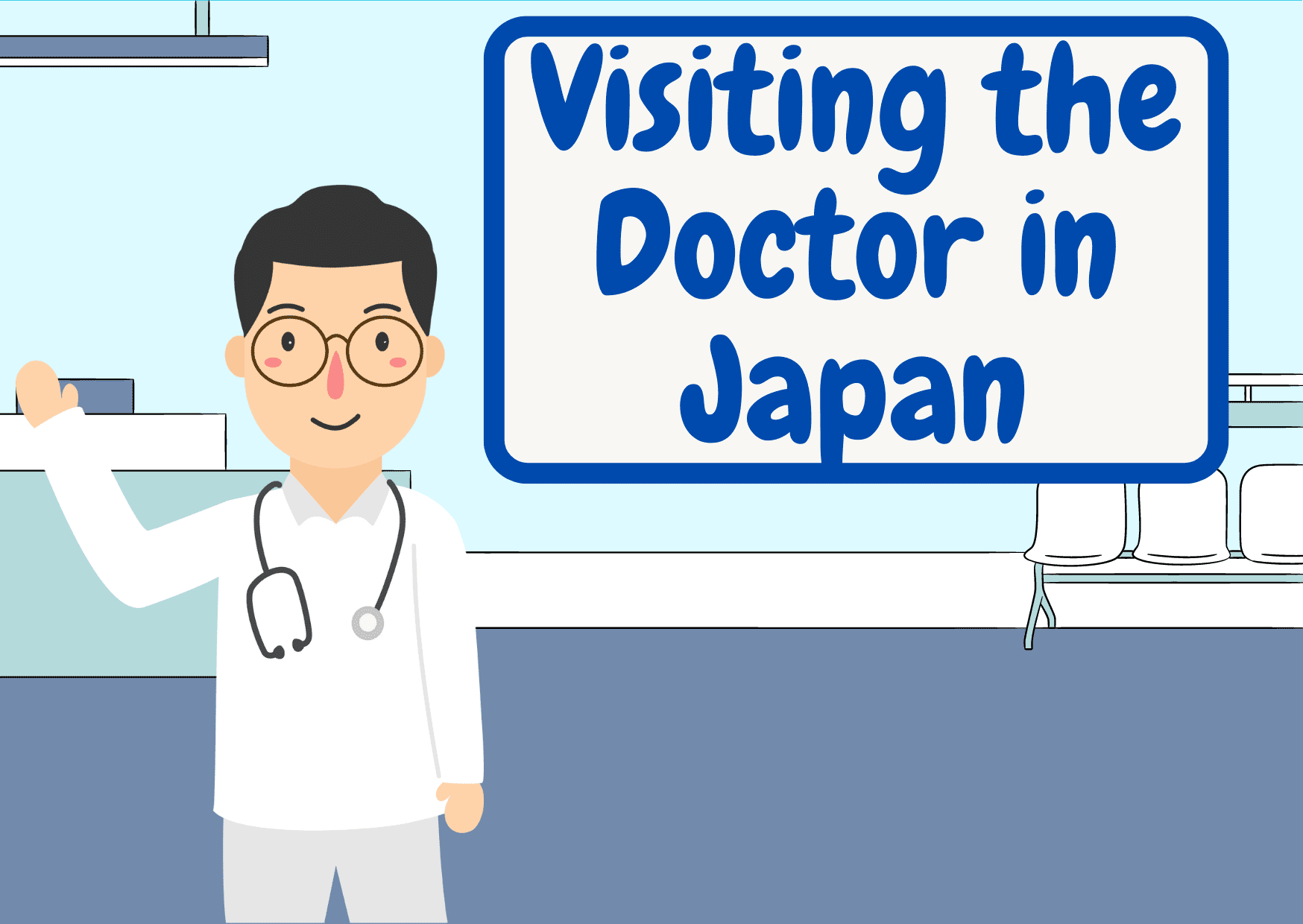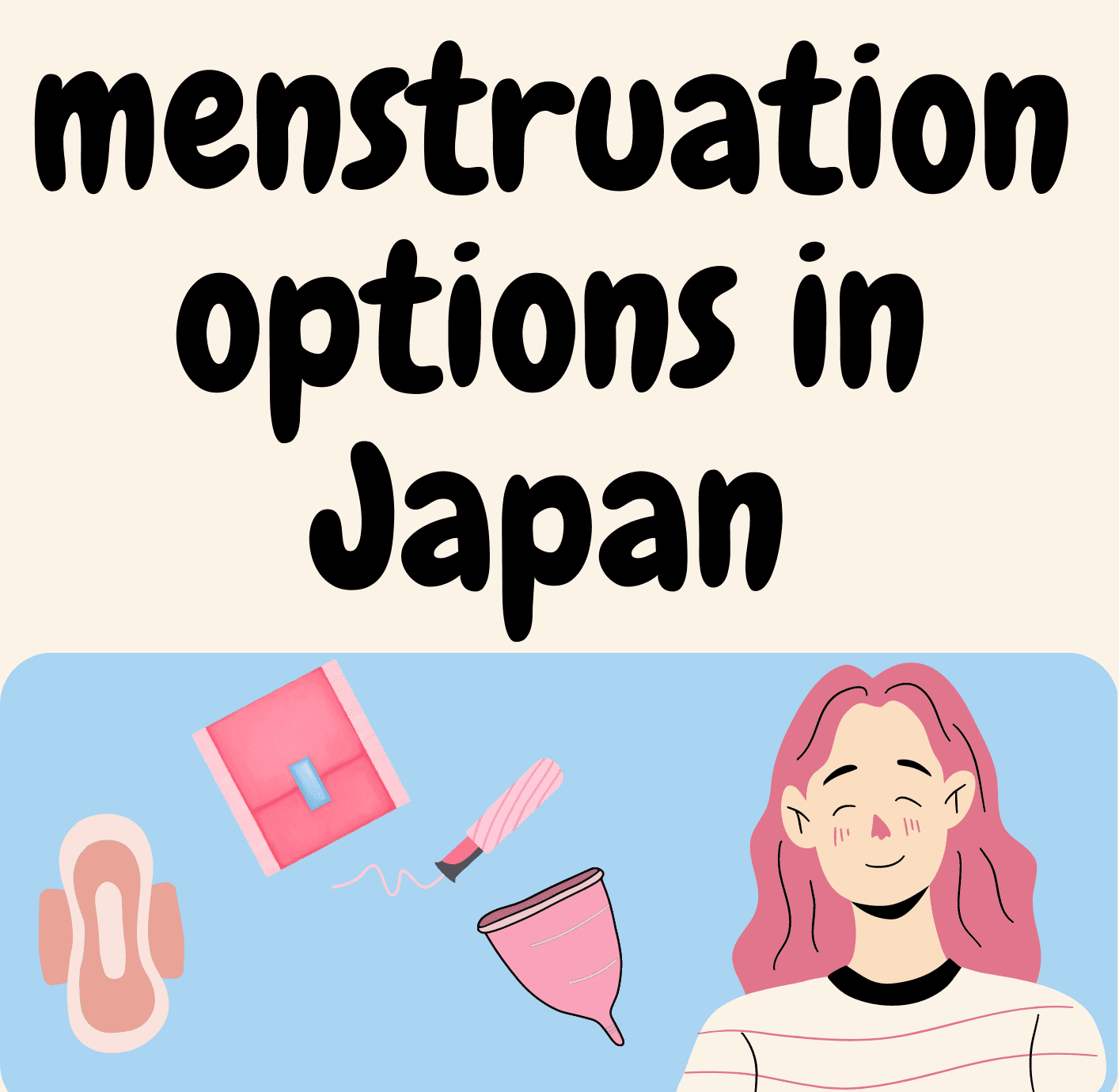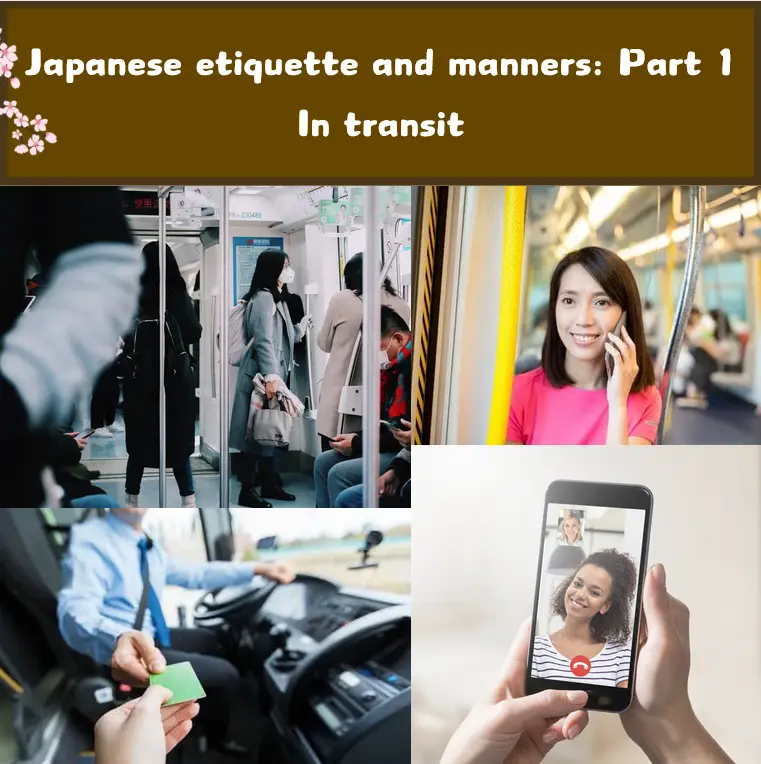If you are going to stay for a while, then visiting the doctor in Japan might be unavoidable! Here is some advice if you are looking to visit a doctor during your stay.
In an emergency please call 199. They will send an ambulance to you. (Free of Charge)
- In an emergency situation
- Japanese in an emergency
- Questions you may be asked in an emergency
- How do I find a doctor in Japan who can speak English?
- Japanese to use at the hospital and clinics
- Common Vocabulary
- Common phrases
- Questions you may be asked by receptionists
- Questions you may be asked by doctors or nurses
- What are some things to remember when visiting a doctor in Japan?
- Point 1: Always wear a mask!
- Point 2: Bring your medicine book
- Point 3: Bring your health insurance card and documents
- Point 4: Prepare your cash beforehand
- Point 4: If you are struggling, get an interpreter or Japanese-speaking friend to help you.
In an emergency situation
In an emergency please call 199. They will send an ambulance to you. (Free of Charge)
Staff may not always speak your language, but there are often interpreters who can join the call. Never hesitate to call in an emergency. Stay calm and do your best to explain in either English or Japanese!
If you are having a medical emergency, call 199 as soon as possible.
It is always good to plan ahead, so here are some Japanese phrases and questions you may be asked in an emergency.
Japanese in an emergency
The phrases highlighted in red are especially important
- English: “I need an ambulance.” Japanese: 救急車が必要です。(きゅうきゅうしゃがひつようです。, kyuukyuusha ga hitsuyou desu.)
- English: “I am having difficulty breathing.” Japanese: 呼吸が困難です。(こきゅうがこんなんです。, kokyuu ga konnan desu.)
- English: “I am bleeding heavily.” Japanese: 出血がひどいです。(しゅっけつがひどいです。, shukketsu ga hidoi desu.)
- English: “Please hurry.” Japanese: お急ぎください。(おいそぎください。, oisogi kudasai.)
- English: “My address is…” Japanese: 私の住所は…です。(わたしのじゅうしょは…です。, watashi no juusho wa…desu.)
- English: “The nearest landmark is…” Japanese: 一番近い目印は…です。(いちばんちかいめじるしは…です。, ichiban chikai mejirushi wa…desu.)
- English: “I am in pain.” Japanese: 痛みがあります。(いたみがあります。, itami ga arimasu.)
- English: “I have been injured.” Japanese: 怪我をしました。(けがをしました。, kega o shimashita.)
- English: “I am feeling dizzy.” Japanese: めまいがします。(めまいがします。, memai ga shimasu.)
- English: “I am having chest pain.” Japanese: 胸が痛いです。(むねがいたいです。, mune ga itai desu.)
- English: “I am feeling weak.” Japanese: 弱っています。(よわっています。, yowatteimasu.)
- English: “I am having trouble speaking.” Japanese: 話すのが難しいです。(はなすのがむずかしいです。, hanasu no ga muzukashii desu.)
- English: “I am pregnant.” Japanese: 妊娠しています。(にんしんしています。, ninshin shiteimasu.)
- English: “I have a chronic condition.” Japanese: 慢性の病気を持っています。(まんせいのびょうきをもっています。, mansei no byouki o motteimasu.)
- English: “I am alone.” Japanese: 一人です。(ひとりです。, hitori desu.)
- English: “Please come quickly.” Japanese: 早く来てください。(はやくきてください。, hayaku kite kudasai.)
Questions you may be asked in an emergency
- English: “What is the nature of your emergency?” Japanese: どのような緊急事態ですか?(どのようなきんきゅうじたいですか?, dono you na kinkyuu jitai desu ka?)
- English: “Where are you calling from? What is the address?” Japanese: どこから電話していますか?住所は何ですか?(どこからでんわしていますか?じゅうしょはなんですか?, doko kara denwa shiteimasu ka? juusho wa nan desu ka?)
- English: “What is your name and phone number?” Japanese: お名前と電話番号を教えてください。(おなまえとでんわばんごうをおしえてください。, onamae to denwa bangou o oshiete kudasai.)
- English: “How many people are injured?” Japanese: けがをした人は何人いますか?(けがをしたひとはなんにんいますか?, kega o shita hito wa nannin imasu ka?)
- English: “Are you or anyone else in immediate danger?” Japanese: 今直接危険にさらされている人はいますか?(いまちょくせつきけんにさらされているひとはいますか?, ima chokusetsu kiken ni sarasarete iru hito wa imasu ka?)
- English: “Is the area safe for emergency responders?” Japanese: 現場は救急隊に安全ですか?(げんばはきゅうきゅうたいにあんぜんですか?, genba wa kyuukyuutai ni anzen desu ka?)
- English: “Can you describe the situation or injuries?” Japanese: 状況やけがについて説明できますか?(じょうきょうやけがについてせつめいできますか?, joukyou ya kega ni tsuite setsumei dekimasu ka?)
- English: “Are there any hazards nearby, such as fire or gas leaks?” Japanese: 近くに火災やガス漏れなどの危険がありますか?(ちかくにかさいやガスもれなどのきけんがありますか?, chikaku ni kasai ya gasumore nado no kiken ga arimasu ka?)
Finally, from personal experience, I can say the staff on the 199 hotline are so kind and attentive. The paramedics are just as well. They will definitely support you, so be assured that you can rely on them!
How do I find a doctor in Japan who can speak English?
Each municipality has its own website/database of English-speaking clinics and hospitals.
Here is an example of one of the municipal websites for finding clinics with foreign language support. This is Hiroshima’s website.
If you aren’t sure how to access your municipality’s database, you can start by checking English sites such as the ones below.
https://www.alljapanrelocation.com/living-guides/hospitals/
https://www.japanlivingguide.net/health-and-safety/health/hospitals-in-tokyo/
Japanese to use at the hospital and clinics
There may be situations in which you cannot find English support! Here is some Japanese to help you out.
Common Vocabulary
- Hospital – 病院 (びょういん, byouin)
- Clinic – クリニック (くりにっく, kurinikku)
- Doctor – 医者 (いしゃ, isha) or 医師 (いし, ishi)
- Nurse – 看護師 (かんごし, kangoshi)
- Patient – 患者 (かんじゃ, kanja)
- Appointment – 予約 (よやく, yoyaku)
- Emergency – 緊急 (きんきゅう, kinkyuu)
- Emergency Room – 救急室 (きゅうきゅうしつ, kyuukyuushitsu) or 救急センター (きゅうきゅうせんたー, kyuukyuusentaa)
- Waiting Room – 待合室 (まちあいしつ, machiaishitsu)
- Reception – 受付 (うけつけ, uketsuke)
- Medical Examination – 診察 (しんさつ, shinsatsu)
- Prescription – 処方箋 (しょほうせん, shouhousen)
- X-ray – レントゲン (れんとげん, rentogen)
- Blood Test – 血液検査 (けつえきけんさ, ketsueki kensa)
Common phrases
- English: “I’m not feeling well.” Japanese: 具合が悪いです。(ぐあいがわるいです。, guai ga warui desu.)
- English: “I have an appointment.” Japanese: 予約をしています。(よやくをしています。, yoyaku o shiteimasu.)
- English: “I need to see a doctor.” Japanese: 医者に診てもらいたいです。(いしゃにみてもらいたいです。, isha ni mite moraitai desu.)
- English: “I have a fever.” Japanese: 熱があります。(ねつがあります。, netsu ga arimasu.)
- English: “I have a headache.” Japanese: 頭痛があります。(ずつうがあります。, zutsuu ga arimasu.)
- English: “I have a sore throat.” Japanese: のどが痛いです。(のどがいたいです。, nodo ga itai desu.)
- English: “I need a prescription.” Japanese: 処方箋が必要です。(しょほうせんがひつようです。, shouhousen ga hitsuyou desu.)
- English: “Where is the pharmacy?” Japanese: 薬局はどこですか?(やっきょくはどこですか?, yakkyoku wa doko desu ka?)
- English: “How much will it cost?” Japanese: いくらかかりますか?(いくらかかりますか?, ikura kakarimasu ka?)
- English: “Thank you for your help.” Japanese: 助けていただきありがとうございます。(たすけていただきありがとうございます。, tasukete itadaki arigatou gozaimasu.)
Questions you may be asked by receptionists
- English: “Do you have an appointment?” Japanese: 予約はありますか?(よやくはありますか?, yoyaku wa arimasu ka?)
- English: “What is your name?” Japanese: お名前は何ですか?(おなまえはなんですか?, onamae wa nan desu ka?)
- English: “What is your date of birth?” Japanese: 生年月日は何ですか?(せいねんがっぴはなんですか?, seinen gappi wa nan desu ka?)
- English: “What is your address?” Japanese: 住所は何ですか?(じゅうしょはなんですか?, juusho wa nan desu ka?)
- English: “Do you have health insurance?” Japanese: 健康保険に入っていますか?(けんこうほけんにはいっていますか?, kenkou hoken ni haitteimasu ka?)
- English: “What is your phone number?” Japanese: 電話番号は何ですか?(でんわばんごうはなんですか?, denwa bangou wa nan desu ka?)
- English: “Are you experiencing any symptoms?” Japanese: 症状はありますか?(しょうじょうはありますか?, shoujou wa arimasu ka?)
- English: “Have you been to this hospital before?” Japanese: この病院に来たことがありますか?(このびょういんにきたことがありますか?, kono byouin ni kita koto ga arimasu ka?)
- English: “Do you have any allergies?” Japanese: アレルギーはありますか?(あれるぎーはありますか?, arerugii wa arimasu ka?)
- English: “What is the purpose of your visit today?” Japanese: 今日の受診目的は何ですか?(きょうのじゅしんもくてきはなんですか?, kyou no jushin mokuteki wa nan desu ka?)
Questions you may be asked by doctors or nurses
- English: “What seems to be the problem?” Japanese: どうしましたか?(dou shimashita ka?)
- English: “When did your symptoms start?” Japanese: 症状はいつからですか?(しょうじょうはいつからですか?, shoujou wa itsu kara desu ka?)
- English: “How long have you been feeling this way?” Japanese: その症状はどのくらい続いていますか?(そのしょうじょうはどのくらいつづいていますか?, sono shoujou wa dono kurai tsuzuite imasu ka?)
- English: “Where does it hurt?” Japanese: どこが痛いですか?(どこがいたいですか?, doko ga itai desu ka?)
- English: “Have you had this problem before?” Japanese: 以前に同じ症状がありましたか?(いぜんにおなじしょうじょうがありましたか?, izen ni onaji shoujou ga arimashita ka?)
- English: “Are you taking any medication?” Japanese: 薬を飲んでいますか?(くすりをのんでいますか?, kusuri o nonde imasu ka?)
- English: “Do you have any allergies?” Japanese: アレルギーはありますか?(あれるぎーはありますか?, arerugii wa arimasu ka?)
- English: “Do you have a family history of this condition?” Japanese: この病気の家族歴はありますか?(このびょうきのかぞくれきはありますか?, kono byouki no kazokureki wa arimasu ka?)
- English: “Have you traveled recently?” Japanese: 最近旅行をしましたか?(さいきんりょこうをしましたか?, saikin ryokou o shimashita ka?)
- English: “Are you experiencing any other symptoms?” Japanese: 他にどんな症状がありますか?(ほかにどんなしょうじょうがありますか?, hoka ni donna shoujou ga arimasu ka?)
What are some things to remember when visiting a doctor in Japan?
Point 1: Always wear a mask!
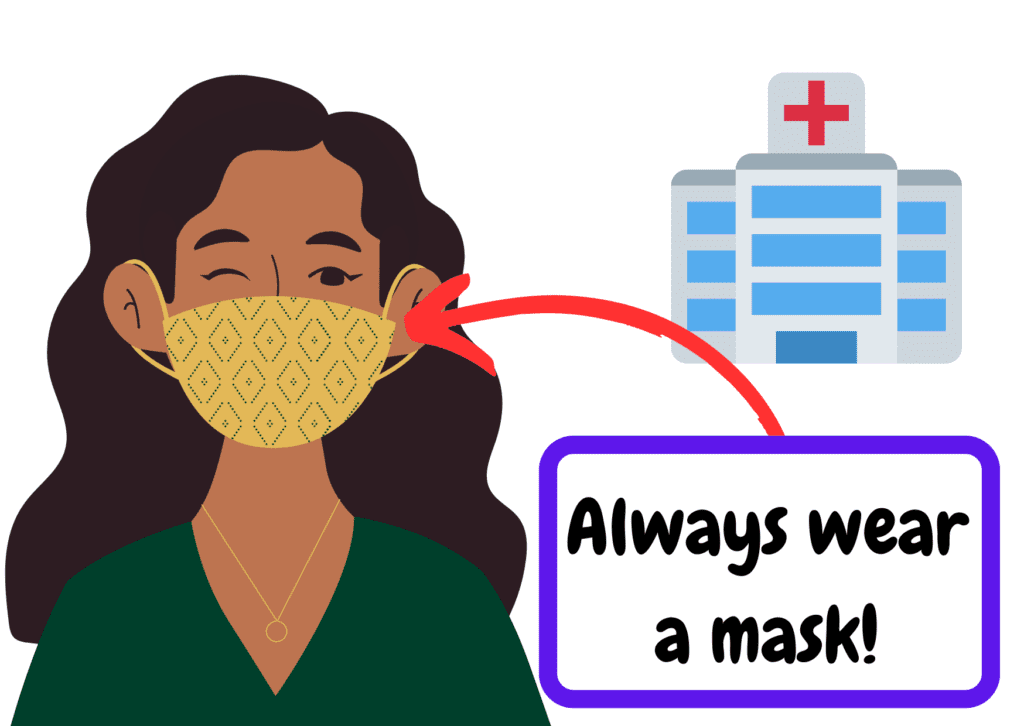
Point 1:
Always wear or bring a mask when you visit a clinic or hospital in Japan.
This is considered good manners, and it will protect you from spreading germs or getting germs from someone else.
You may be refused entry if you don’t bring a mask, so please keep one with you when you plan on visiting a clinic or hospital!
Point 2: Bring your medicine book
Point 2:
On your first visit to a clinic or hospital in Japan, you may be offered a medicine notebook called お薬手帳 (okusuri techo).
This book is a record of all your prescriptions and you should bring it with you to the clinic/hospital after you get one.
It is also helpful for you, because you can keep track of the medicine you are taking!
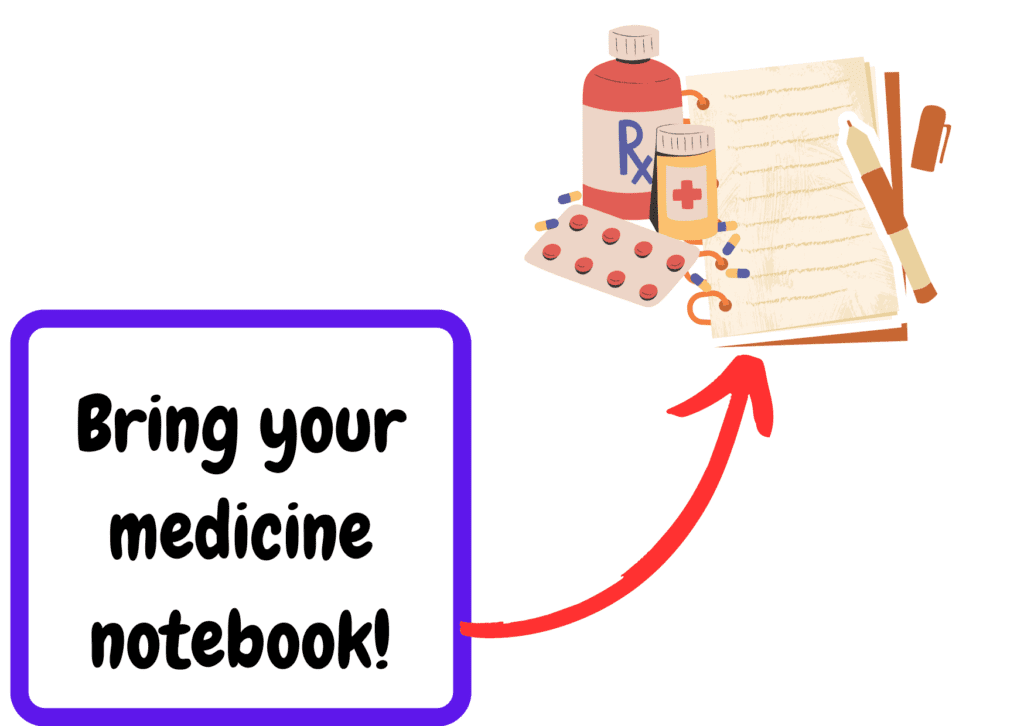
Point 3: Bring your health insurance card and documents
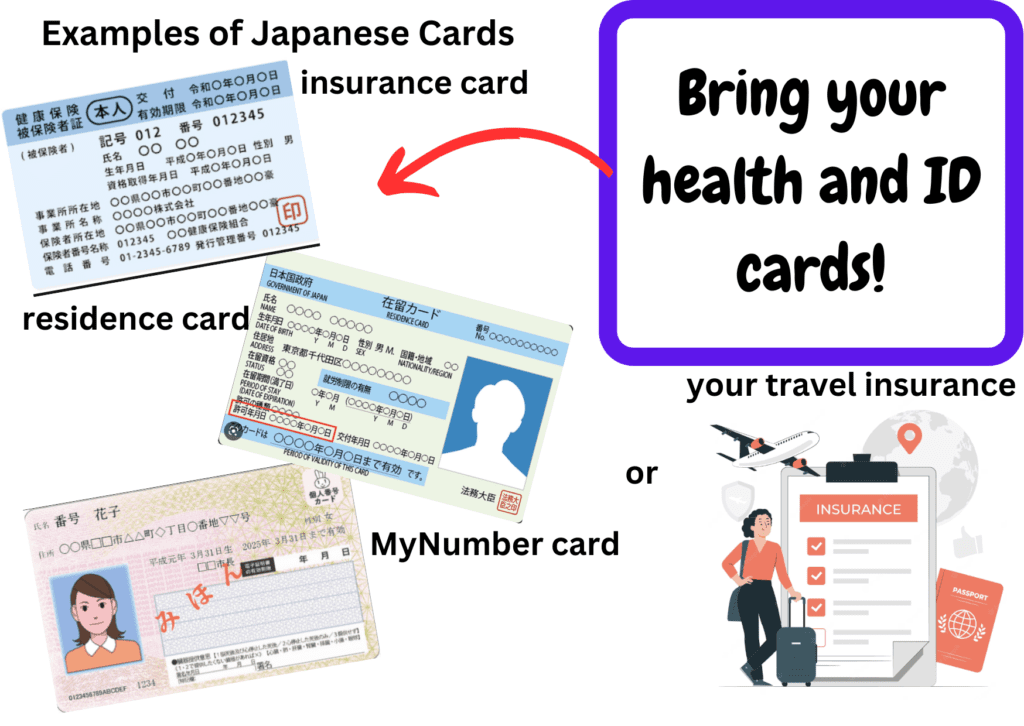
Point 3:
Bring your health insurance card and identification card. If you have one, bring your MyNumber card!
If you are staying for more than 3 months in Japan, you should be registered with the national healthcare system and should have a residence card. Please bring them with you every time you visit the clinic.
If you are visiting as a tourist, you should bring your own ID and your travel insurance.
If you forget to bring your cards, you will probably have to pay the full bill from the hospital that day.
Point 4: Prepare your cash beforehand
Point 4:
Get some cash out before you visit the hospital. Many hospitals and clinics in Japan do not accept credit cards, debit cards, or electronic money.
It is a good idea to take out some money in cash before you visit the clinic or hospital.
If you find yourself in a situation in which you need cash, but forgot to bring it. You can ask the staff if it is ok to visit a nearby convenience store to withdraw the money.
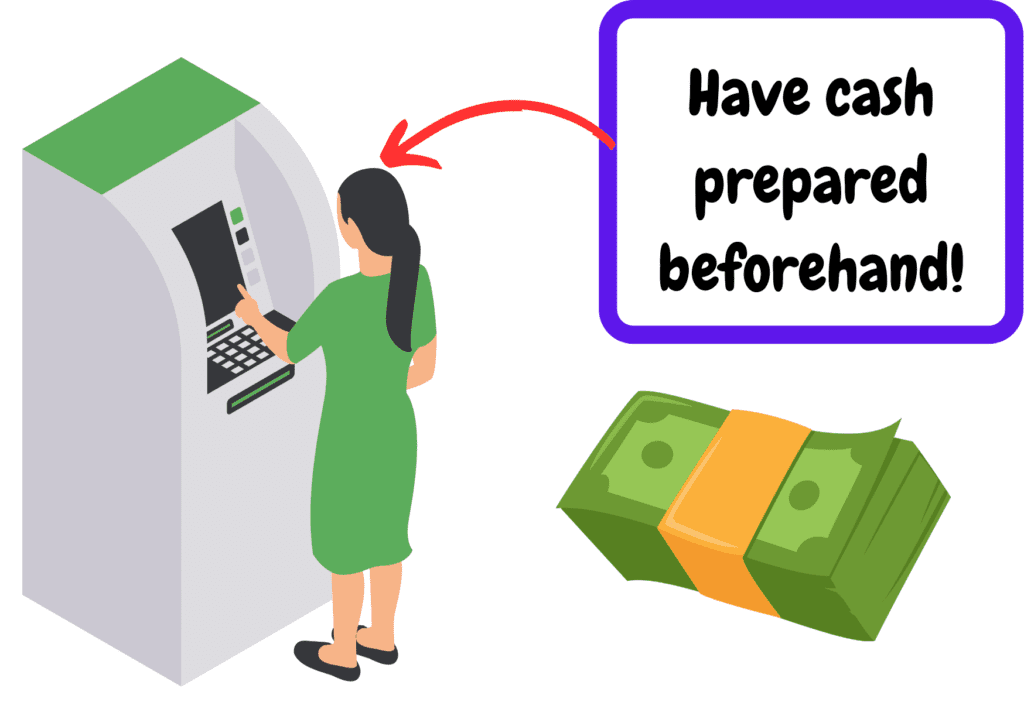
Point 4: If you are struggling, get an interpreter or Japanese-speaking friend to help you.
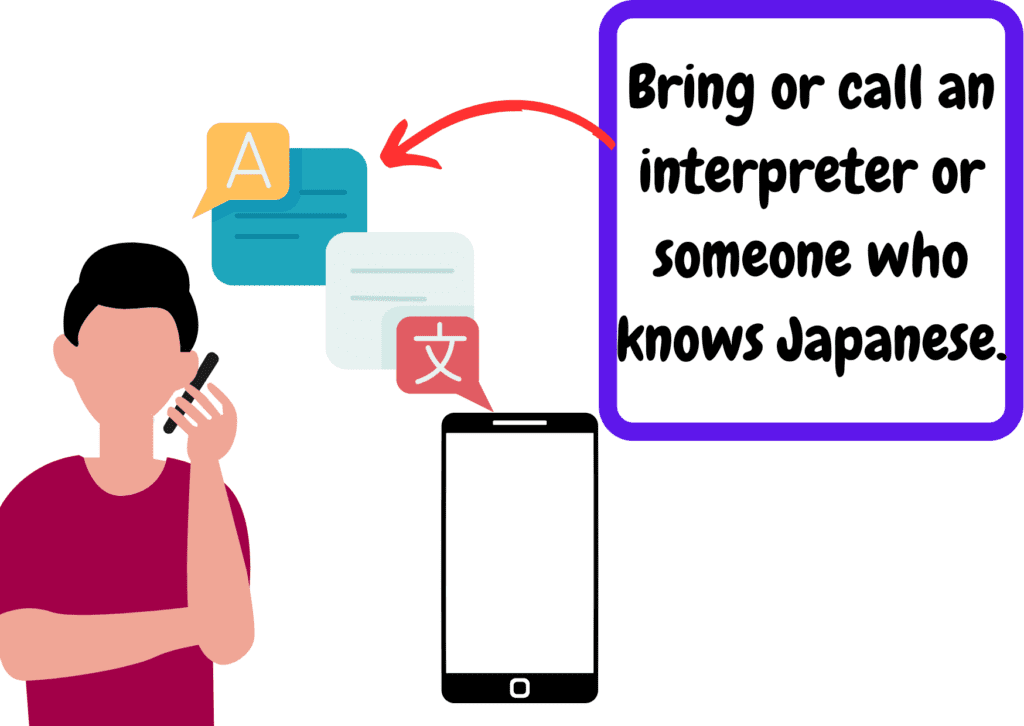
Point 5:
If you can’t speak Japanese or aren’t confident in speaking Japanese, then you should get an interpreter or bring a friend who knows Japanese.
Although some clinics and hospitals have English support, many do not.
If you aren’t sure, try calling the hospital or clinic in advance or checking out their website.
Visiting the gynecologist? This article has some helpful phrases to talk about your menstrual cycle and some recommendations for menstruation products!

